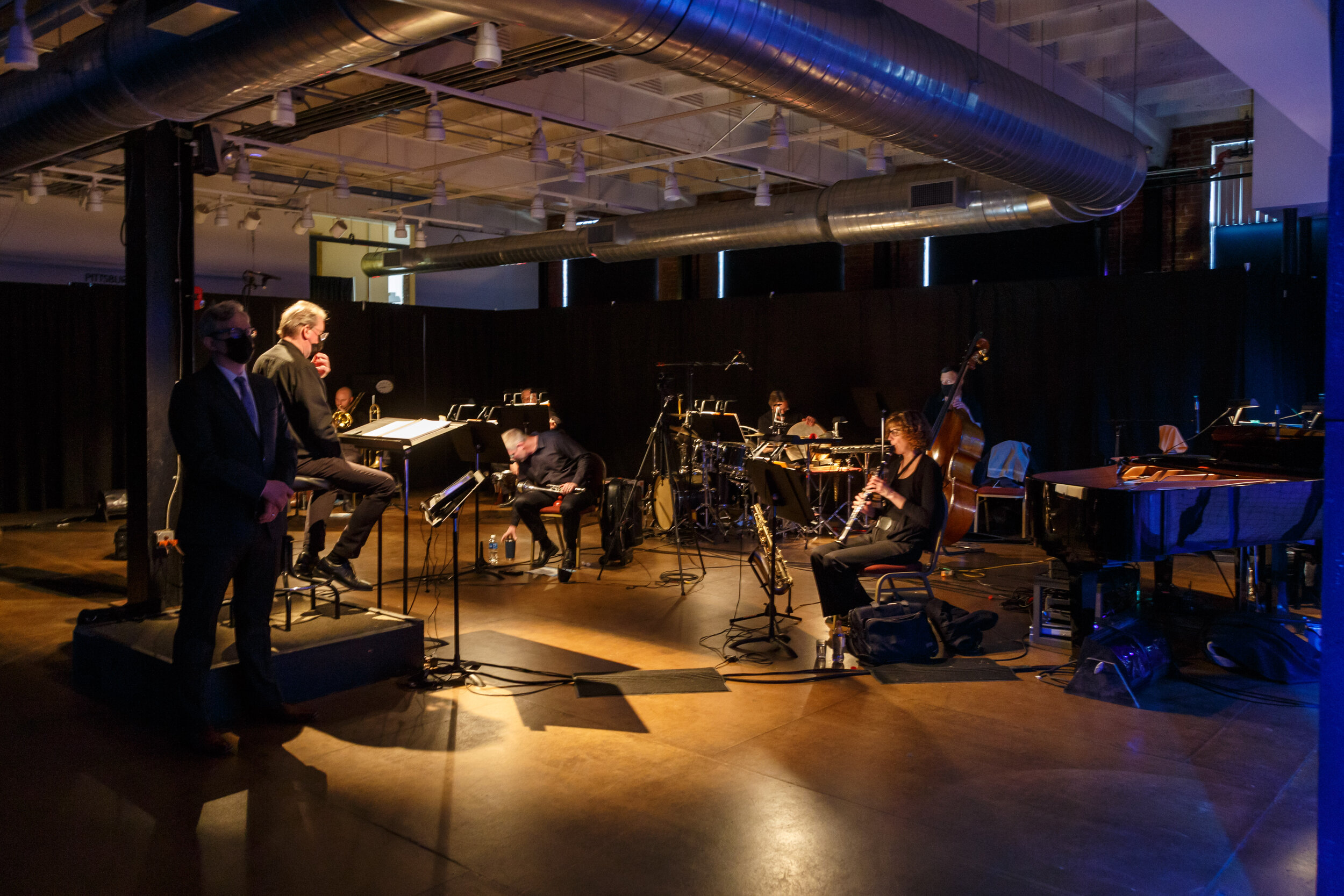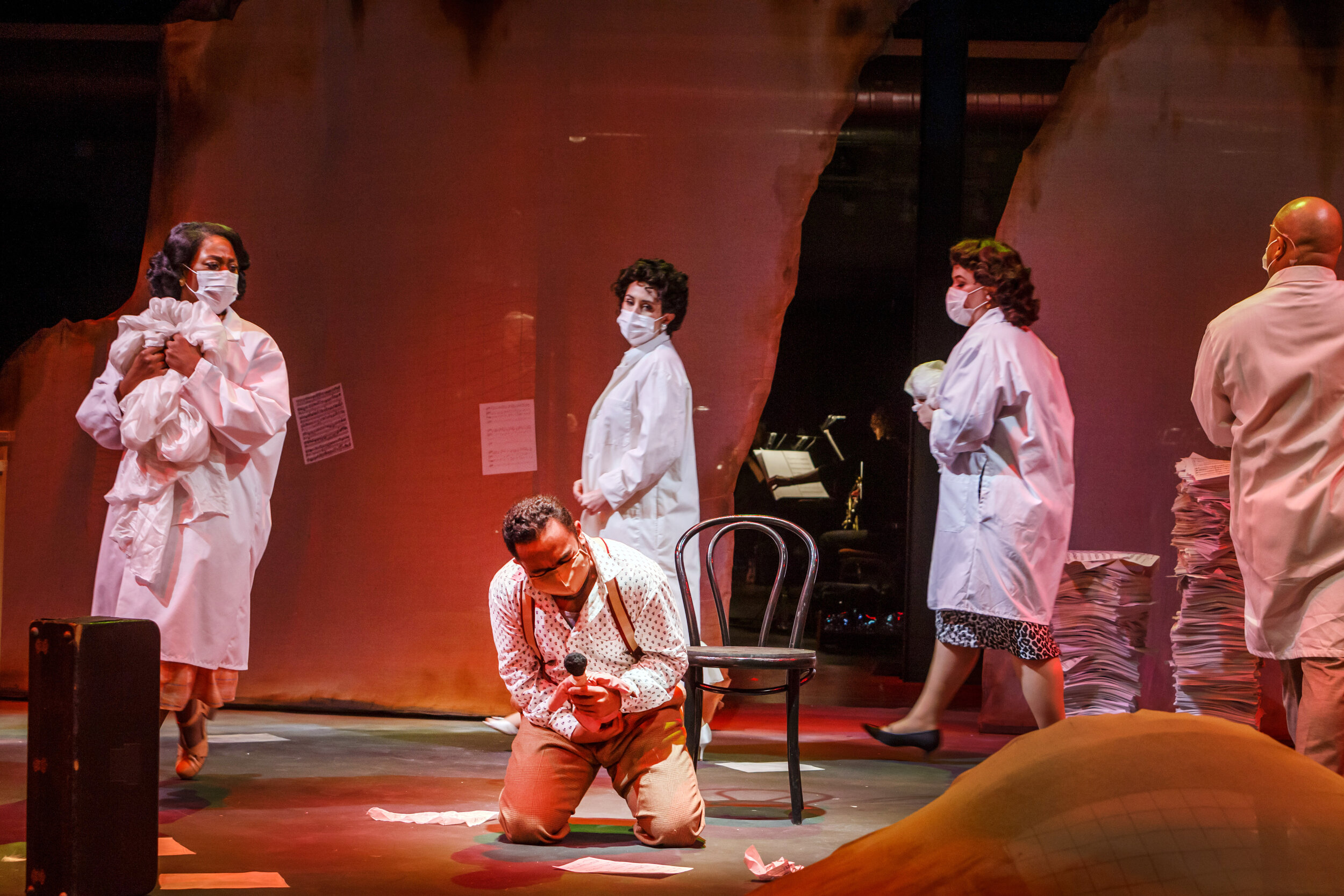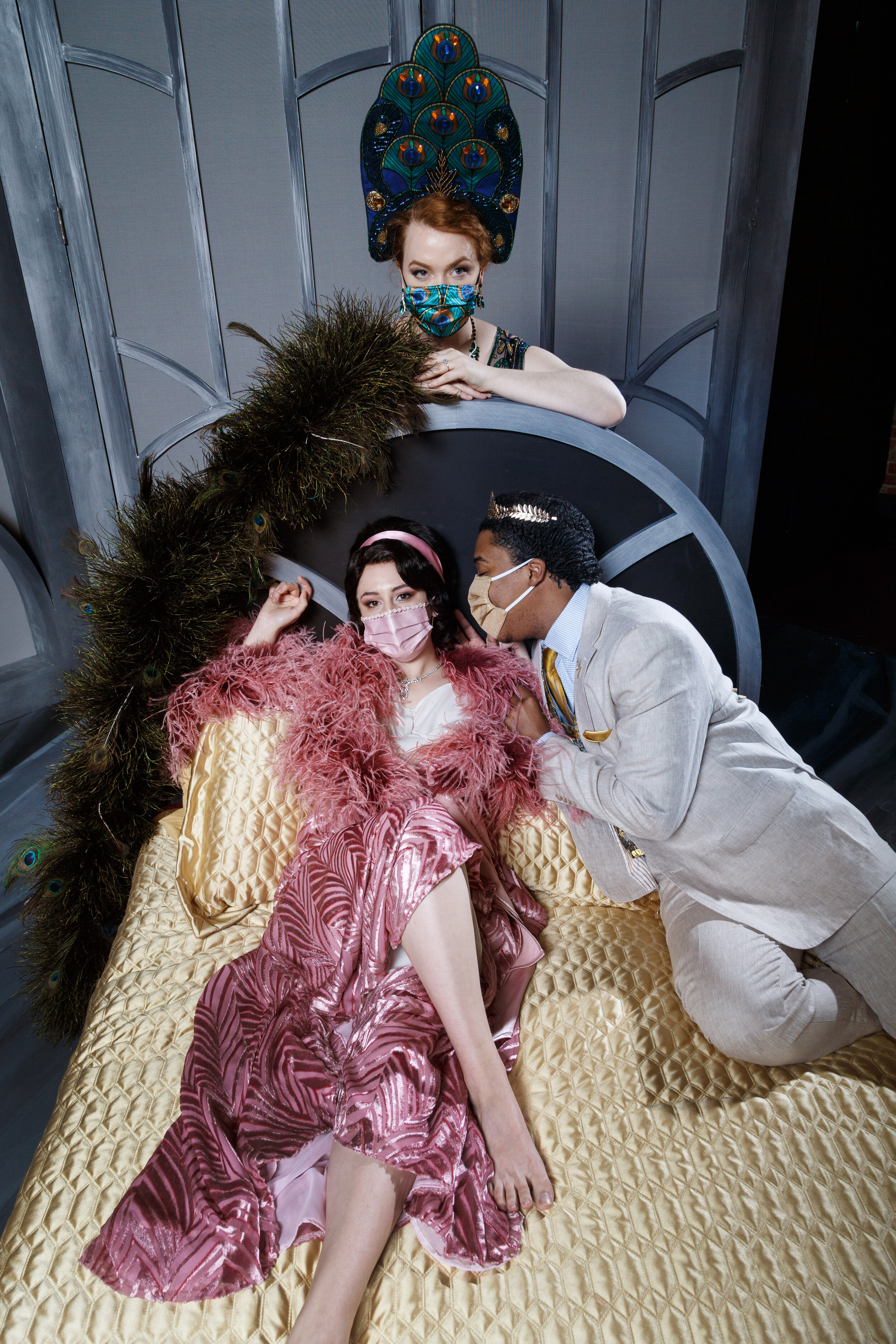Maestro Antony Walker. Photo courtesy of Pittsburgh Opera.
I had just finished watching Pittsburgh Opera’s live stream of Charlie Parker’s Yardbird on my computer, and as the credits rolled along, I noticed that the name of the conductor was Antony Walker. Frankly, I was expecting a different name for this one; this was jazz, no strings attached. I was already aware that he had conducted Mozart’s Cosi fan tutte in October for PO and would be conducting Handel’s Semele in May. Something went clunk in my brain – this season, Maestro Walker is conducting music from the Romantic Era (Mozart), 21th century modern jazz (Schnyder), and the Baroque Era (Handel). I wondered what it was like for him conducting music of such varied styles. Was conducting jazz a chore, maybe even an unwelcome departure from his mainstream? So, I asked, and he graciously agreed to chat with me by phone. One of his first comments was that the music was not as different as you might think, especially between modern jazz and baroque opera. Now, not many people listening to jazz would muse, “You know, that reminds me of Handel”; so, what was Maestro Walker getting at?
Antony Walker is Music Director and Conductor for the Pittsburgh Opera. From the US to Europe to his native Australia, he has almost 200 conducting productions to his credit. He also has several other impressive gigs you can read about on the PO website. It is important to know that in addition to conducting orchestras, he also has served as a chorus master, and he trained as a tenor (he once sang the tenor role from the PO orchestra pit until a tenor arrived late). Maestro Walker speaks with moral authority to both singers and musicians. Clearly, he and PO have needed every bit of that experience for this COVID-shaped 2020-2021 season. Pittsburgh has managed to pull off what no other company in the US has done that I am aware of – have a live, in a theater, before an audience, season of staged operas. Strict adherence to COVID guidelines has required the audience, singers, and musicians to wear masks and be socially distanced. Conductor Walker trained for conducting with a mask on by wearing a mask during his two-mile runs; he also had to adapt to conducting without using facial expressions. Audience size had to be greatly reduced, and the operas had to be scaled back to chamber opera length to avoid intermissions, where attendees might mill together; and the operas had to be performed with fewer instruments and players in an ensemble, placed on stage behind the singers/actors, rather than in a pit where the singers and conductor face each other. Also, the singers employed were largely Pittsburgh Opera’s Resident Artists, who could be quarantined together and trained in pandemic restrictions during their training period. Producing staged operas is difficult and expensive in the best of times, and these were not the best of times. And just to make the difficulty factor a ten on a ten-point scale, let’s also vary the musical styles.
From October 2020, stage and set during Così fan tutte. with Conductor Antony Walker center stage in the rear. Photo by David Bachman Photography; courtesy of Pittsburgh Opera
Conductor Walker avows that once Yardbird was scheduled, he really looked forward to conducting it; he has conducted many 20th and 21st century works and finds them fulfilling. Fine, but how is it that he sees jazz and baroque opera as alike? First, he stated that both rely heavily on virtuosity and ornamentation. Both have a freedom of approach. Ornamentation for Yardbird is written into the vocal lines, but it must be performed as if the singer is extemporizing. Such ornamentations in da capo arias of baroque opera were once made up on the spot, but now are sorted out beforehand; however, they also need to sound extemporized. Expressive vocalization for neither of these vocal formats is based on text. One can compare the melismatic ornamentation (changing tone while singing one elongated syllable) in baroque opera with scatting in jazz (think Ella Fitzgerald singing a string of syllables without meaning). The importance is the expressive nature of the gesture in each format, not exactly the same but used similarly to delight audiences. Furthermore, he says that baroque opera arias start with straight tone, which is also prevalent in jazz and blues singing; he jokes when in doubt for either of these formats, sing straight tone.
Photo on left shows a practice session for Conductor Walker and the jazz ensemble for Charlie Parker’s Yardbirrd; photo on the right of a scene from Yardbird shows a break in the curtain where the ensemble played. Photos by David Bachman Photography; courtesy of Pittsburgh Opera.
Lastly, he says that much baroque music is based on dance, giving it peppy rhythms and the same for jazz. Conductor Walker goes as far as to compare Yardbird to French baroque opera. Yardbird’s arias are all self-contained pieces, like in French baroque opera. Rather than being constructed with a dramatic through line, they contain a series of musings. Each aria is a self-contained scene, very similar to French baroque opera. Scenes are expressing thoughts or ideas more than telling a story. He says that resident artists performing these two forms do not require a huge a shift in mind-set to approach them. An interesting aspect of the season for audiences is getting to hear largely the same singers singing in these different modes. Conductor Walker further stated that in conducting, he uses the same gestures in Yardbird as for Handel. He didn’t use a baton for Yardbird, where he shaped the music with his hands, rather than conducting strict patterns of music with a baton. Same for baroque, where he projects the rhythm with his body and shapes the music with his hands.
Okay, I am mostly following all that, but what does it mean for me, the listener, for whom jazz and baroque are really different. Maestro Walker did also allude to differences as well. He went on to explain that Yardbird is a lot more harmonically complex than Handel. He had to work out Composer Schnyder’s harmonics and how he uses them expressively. Each composer does this differently. Conductor Walker has studied and worked with Handel’s harmonics for decades. He knows how Handel uses harmonies expressively. He had to learn what Schnyder was trying to do. He also admitted that performing Yardbird without strings was a little tricky since the score was originally composed with strings in the orchestra. PO’s was a reduced version originally written by Schnyder for Atlanta Opera. PO could not perform it in original format, given COVID restrictions. I personally thought the music was highly enjoyable as performed. Conductor Walker says it is a difficult score, moving quickly both vocally and musically between extremes. He is proud of his group of COVID players and hopes one day to conduct the fully instrumented version.
I had imagined each operatic work was a separate thing in and of itself; you do one and you move on to the next, with its own requirements. Listening to them as a layman, I think of operas from different periods as very different. It is Maestro Walker’s business to see them as both different and similar. He loves conducting a range of music and says that each piece informs how he conducts other pieces. He is most concerned with giving each composer his or her own style. He wants to explore what each composer’s style is and to bring that out. We benefit from his professionalism and craftsmanship. Seeing the similarities as well as the differences allows him to present each composer’s score that he is conducting as authentically as possible, clearly imbuing the performance with that conductor’s style.
Pre-production scene from Pittsburgh Opera’s Semele: · Aaron Crouch as Jove, Veronique Filloux as Semele (seated), and Maire Therese Carmack as Juno. Photo by David Bachman Photography; courtesy of Pittsburgh Opera.
Ok, I got it. What can we expect with Handel’s Semele? At least two major innovations in the singing and music, and one in the staging. First, he has had to use his experience and insights working with Director Kristine McIntyre to reduce a three-hour opera by almost half to keep within the COVID time limit; much of the choral music had to be reduced. This they did with Cosi fan tutte to give us a marvelous result. The Semele performance will be enhanced by partnering with Chatham Baroque, who play on period instruments; Maestro Walker has worked extensively conducting ensembles with period instruments through his work with Pinchgut Opera in Australia. Music Director Walker says he had wanted to perform Semele because he thought this year’s Resident Artists would make an almost perfect cast. I pointed out that Semele is considered a showpiece opera for the soprano who sings the role of Semele. He quickly stated that soprano Véronique Filloux was totally ready for both the challenge and the opportunity; having heard her sing in Cosi and Yardbird, I am inclined to agree. Then, like a good papa, he praised each of the singers in his cast: bass Jeremy Harr (Cadmus/Somnus), soprano Madeline Ehlinger (Ino), mezzo-soprano Maire Therese Carmack (Juno), baritone Yazid Gray (Athamas), soprano Meghan DeWald (Iris), and soon to be a new Resident Artist, tenor Aaron Crouch (Jove),
However, the “almost” in an almost perfect cast is significant. Most Handel opera’s feature a countertenor (formerly a castrati), and Semele calls for one in the role of Athamas. However, there is not a countertenor among the Resident Artists this year. The second innovation for Semele will be having baritone (Yazid Gray) sing that role. Conductor Walker believes it makes for some interesting effects that add to and color the story; I’m intrigued. Oh, there is at least one other innovation for this Semele, worthy of noting. Director McIntyre has moved the time period into the roaring twenties, adding some standout costumes by costume shop manager Jason Bray. While the costumes change, the vanities, jealousies, and the prices to be paid remain the same from the 17th to the 20th century.
Whether you appreciate the similarities to Yardbird or not, I think this Semele is one not to be missed. There has never been anything like it: Music Director Walker’s handcrafted music by Handel supporting Roman gods singing and cavorting around in the 20th century! All that is missing is the popcorn, and if you watch the live stream from home, you can even add that.
The Fan Experience: Seating is greatly limited due to COVID restrictions (about 50 attendees per performance), and season ticket holders get first dibs. Performances of Semele run May 8, 11, 14, 16, 18, and 20, but not surprisingly, are all sold out. You can seek tickets at this link to be put on a waiting list. Your surest option for viewing a performance is to register at this link for Pittsburgh Opera’s free, live stream of the Friday, May 14 performance.
Finally, a tip of the hat to Pittsburgh Opera for valor under the extraordinarily trying conditions imposed by the COVID-19 pandemic. PO not only provided its audience with live staged opera, but also provided work and income to singers, musicians, and staff, and kept their training program alive and functioning. Cheers for that!





